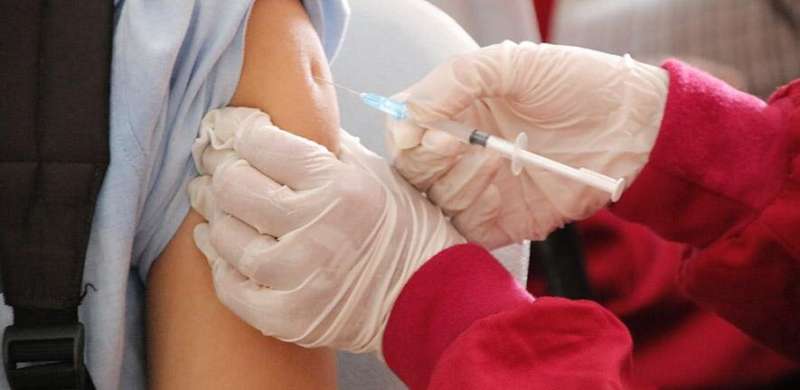This article has been reviewed according to Science X's editorial process and policies. Editors have highlighted the following attributes while ensuring the content's credibility:
fact-checked
peer-reviewed publication
trusted source
proofread
'Aging' immune cell levels could predict how well we respond to vaccines

Cambridge scientists have identified a signature in the blood that could help predict how well an individual will respond to vaccines. The discovery, published today in Nature Communications, may explain why, even among vulnerable patient groups, some individuals have better responses to vaccines than others.
During the COVID-19 pandemic, it has become clear that some patients are better protected by vaccination than others. Many studies have shown that SARS-CoV-2 vaccines are less effective in people with weakened immune systems, but also that this effect is not uniform.
Vaccination involves priming the immune system to look for—and get rid of—invading pathogens, such as viruses and bacteria. In part, this involves stimulating the production of antibodies uniquely programmed to identify a particular invader. These antibodies are themselves produced by a type of immune cell known as a B cell.
One specific subset of B cells is known as age-associated B cells (ABCs). While, on average, less than one in 20 of a healthy individual's B cells is an ABC, the proportion gradually increases as we get older. The reasons for this increase are not yet fully understood, but may include previous infections. Certain people with weakened immune systems accumulate ABCs still faster.
A team from the Medical Research Council (MRC) Toxicology Unit at the University of Cambridge, led by Dr. James Thaventhiran, examined ABCs from two very different patient groups—one composed of people with an inherited condition that impairs the activity of their immune systems and a second group composed of cancer patients taking immunotherapy drugs—as well as from healthy individuals.
Emily Horner, from Thaventhiran's lab, explained the aim of this research, "By looking at patients' B cells, we hoped to learn how we could stratify vulnerable patients—in other words, work out whether some patients were at greater risk from infection, even after vaccination, than others."
The researchers measured the relative proportion of ABCs compared to healthy B cells, and used a technique known as single cell RNA sequencing to look in detail at the activity of cells. They also teamed up with Dr. Nicholas Matheson, from the Cambridge Institute of Therapeutic Immunology and Infectious Disease, to test how these factors influenced the ability of a vaccinated individual's immune system to neutralize live SARS-CoV-2 virus.
Dr. Juan Carlos Yam-Puc, also from the MRC Toxicology Unit, said, "What we found, much to our surprise, was that the age-associated B cells in these very different groups looked the same. The key difference was in the amount of these cells—the greater the proportion of ABCs in an individual's blood, the less effective that individual was post-vaccination at neutralizing the virus."
This could help explain the variability seen within particular patient groups in responses to the vaccine: people with fewer ABCs are likely to respond better to vaccines.
Although the researchers examined ABCs in the context of responses to the SARS-CoV-2 vaccine, they believe that this phenomenon will almost certainly apply more widely, for example to the annual influenza vaccine.
Dr. Pehuén Pereyra Gerber, who performed the experiments with live SARS-CoV-2 virus in Matheson's lab, added, "Looking at blood levels of ABCs could tell us that person A should respond well to a vaccine, while person B might need a stronger vaccine or to be prioritized to receive a booster."
Thaventhiran added, "Ultimately, this research could lead to the development of a clinical test to predict vaccine efficacy for immunodeficient patients, and for the population more generally."
More information: Juan Carlos Yam-Puc et al, Age-associated B cells predict impaired humoral immunity after COVID-19 vaccination in patients receiving immune checkpoint blockade, Nature Communications (2023). DOI: 10.1038/s41467-023-38810-0




















